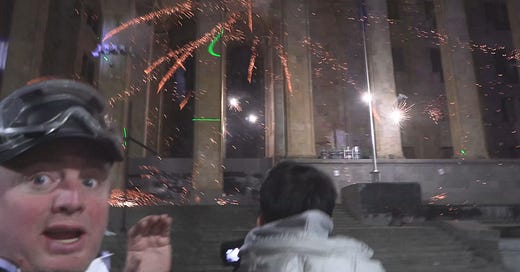Tbilisi, Georgia — For two weeks, the capital of Georgia has been a center of protests that have drawn the world’s attention. As I stand outside Liberty Square Metro Station, just a short distance from the Parliament building, the atmosphere is charged with anticipation. Over 2 weeks of consecutive protests and unrest have been in Tbilisi. However, the story here extends beyond the crowds chanting in the streets.
My goal in Tbilisi has been to dig deeper into the dynamics of these protests, moving beyond the rhetoric of the demonstrators to explore the perspectives of locals and stakeholders not participating in the protests. What emerges is a complex narrative involving historical grievances, political discontent, and alleged external influences.
The Role of NGOs and Allegations of Foreign Influence
The protests have sparked significant discussion about the role of non-governmental organizations (NGOs) in Georgia’s political landscape. Critics, including local political figures and activists, allege that Western funding for NGOs is being funneled to fuel anti-government movements. This claim is not new; it has been a recurring theme in Georgian politics since the post-Soviet era.
In an interview with Nana Kakabadze, a leader of the NGO "Former Political Prisoners for Human Rights," she highlighted the historical evolution of NGOs in Georgia. Initially established to promote democracy and human rights after the Soviet collapse, some of these organizations, she alleges, became entwined with political parties. "They were no longer non-governmental," Kakabadze said, explaining how they transitioned into tools for political opposition funded by Western sources.
Protests: A Youth-Driven Movement?
The composition of the protests skews young, with most participants in their late teens to twenties. Their demands often center around European integration and opposing legislation perceived as authoritarian. Yet, conversations I’ve had with older generations paint a different picture. Many expressed skepticism toward the protesters, describing them as disconnected from Georgia’s historical struggles and overly influenced by external ideologies.
Some locals pointed out the stark divide in perspectives between the streets and quieter neighborhoods. "Not everyone supports the protests," an older resident told me, standing just over a kilometer away from the demonstrations. "Many of us want stability and independence, not more chaos."
The Government’s Response and Historical Context
Georgia’s government, led by the Georgian Dream Party, has faced allegations of authoritarianism, particularly regarding its refusal to fully align with Western agendas. However, many Georgians see this stance as a necessary defense against external pressures, including calls to "open a second front" against Russia amidst the ongoing war in Ukraine.
Kakabadze underscored the irony of accusations against the Georgian government. "We are accused of being pro-Russian simply for protecting our interests," she stated. "But this is about sovereignty. The West demands things from us that even they would not tolerate in their own countries."
Double Standards in Democracy?
A recurring theme in my conversations has been the perception of Western double standards. Protesters who storm government buildings in Georgia are celebrated as freedom fighters, while similar actions in Western countries are labeled as domestic terrorism. This discrepancy fuels distrust and resentment among many Georgians.
What Lies Ahead for Georgia?
As Georgia navigates its path, it faces the daunting challenge of balancing internal unity with external pressures. While the protests dominate international headlines, the majority of Georgians seem to prioritize stability and neutrality over ideological alignment with the West or Russia.
"We are not against democracy or human rights," Kakabadze explained. "But we cannot sacrifice our sovereignty to meet the demands of foreign powers. Georgia must decide its future as an independent nation."
As I continue to document these developments, the stories I hear reflect a nation at a crossroads, grappling with its past, present, and future. The protests, NGOs, and political tensions are all part of a broader narrative about Georgia’s place in the modern world. My commitment remains to bring you these stories unfiltered, supported only by you, my viewers, and not by any external organizations. Together, we can show the world what’s happening here on the ground.





Let me know what you think
The West only wants to destroy--destroy anything, any nation, any person that does not support their global conquest plan. Georgia is the current victim. Congratulations to the legitimate government of Georgia for standing its ground. Congratulations to Patrick Lawrence for reporting it for the world to see.